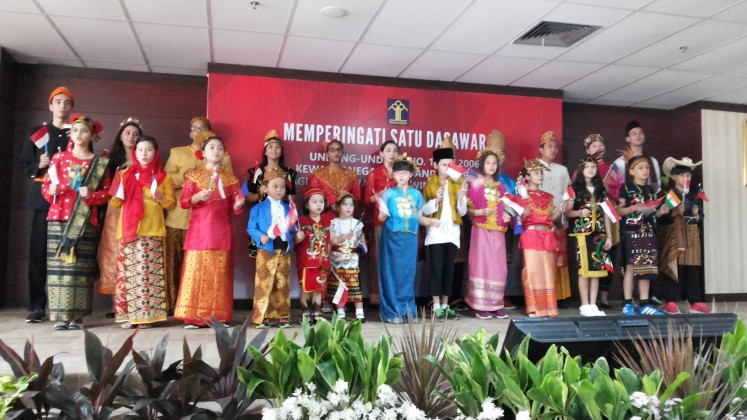Wastewater from houses, hawkers good on gardens: Expert
Decorative plants can be used to treat grey water, potentially cleaning up Jakarta's clogged and foul-smelling rivers, a water management expert says
Change Size

D
ecorative plants can be used to treat grey water, potentially cleaning up Jakarta's clogged and foul-smelling rivers, a water management expert says.
"I believe this is an appropriate solution," said Ratna Hidayat, a water resources researcher at the Public Works Ministry.
Grey water, which is wastewater from washing, bathing or other domestic uses, is usually polluted with detergents and toxic substances that can be harmful to the environment and the human body.
"Grey water often has high phosphorus and nitrogen contents," Ratna said in a phone interview.
"Such substances promote the growth of water hyacinths, which clog waterways and reduce the depths of lakes and dams."
In urban cases, wastewater produces unpleasant aromas in sewers. "Wastewater can also seep into the ground or flow into rivers and become hazardous," she said.
Through research conducted in her own backyard, Ratna found that wastewater could be treated using natural means.
"I started in my own home," she said. "The ground needs nitrogen and phosphor, so I tried experimenting using small pots and found that the detergent amounts decreased after the experiments."
Ratna's methods involved using water plants, such as the common reed, thypa angustifolia, and cyperus papyrus, to absorb toxic substances in water, Tabloid Rumah reports.
"At present there are only 11 cities in Indonesia with adequate unified water management systems," Ratna said.
"In Jakarta, only a few areas have such systems."
However, processing wastewater using water plants requires a fair amount of space. "One must at least own a yard to adopt this method," Ratna said.
The method could be applied at a neighborhood level, not just the household level, she said.
One neighborhood aiming to use a grey water management system, dubbed the "ecotech" garden or wastewater garden, is the Cideng neighborhood in Central Jakarta.
In future, the area's park, measuring some 200 square meters, may partly be watered using filtered grey wastewater from the nearby hawkers who are notorious for their habit of clogging the area's sewers with their wastewater, subdistrict head Siti Nurbaiti said.
There are around 40 hawkers in the Biak area - a culinary attraction for local residents and other Jakartans, Siti said.
"The hawkers usually throw out their wastewater, laden with oily substances, straight into the sewers," Siti said.
"After a while, the fats and oils build up and the sewers become dirty and clogged."
Fats and oils are just a few of the substances that cause problems. The wastewater also contains detergents and other chemicals used to clean dishes.
Siti came across the idea of using wastewater for the park's benefit after reading an article in a magazine about an "ecotech" garden.
"I thought about using the idea, and sent a letter to the water management division of the Public Works Ministry in Bandung. They responded to my inquiry," she said.
Recently, officials from the ministry drew up project designs to use the scheme for the Biak hawkers' waste water.
According to research quoted in the design, a sample of 16 hawkers in the area produces approximately 1,820 liters of wastewater every day.
Real estate developers once discussed the idea of using wastewater in garden systems in their projects, Ratna said.
"They said the using this technology could add value to their products."
Teguh Satria, the chairman of the Association of Indonesian Real Estate Companies, said the association's members had once inquired about the methods but had yet to include them in their development plans.
"There have been no follow ups until now," he said. "*The wastewater system* requires plenty of experts to spread the word."
The usage of the wastewater management system would be discussed further along with other environmentally friendly plans, Teguh said.









